Last Updated on: 11th September 2025, 05:25 am
Have you recently retired and found yourself wondering whether you still need to complete a tax return? It’s a common question among pensioners in the UK, especially when income is no longer coming from a single employer but instead from a mix of state pension, private pensions, savings, or even rental income. The answer isn’t always straightforward and depends on the types and amount of income you receive.
For many pensioners, a tax return may not be necessary, but if you receive any untaxed income or go above the personal allowance threshold, you may fall into the self-assessment category.
Understanding when you need to file and what qualifies as taxable income is key to avoiding penalties and staying compliant with HMRC. In this guide, we’ll break it all down for you in simple, practical terms.
What Counts as Taxable Income for Pensioners?
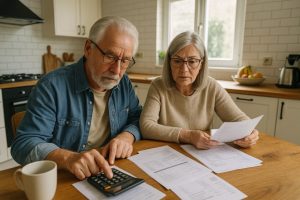
As a pensioner, your income may come from a variety of sources, and it’s important to know which ones are taxable. Even after retirement, you may still be liable to pay income tax if your total income exceeds the personal allowance, which is currently £12,570.
Your state pension is taxable, but is paid without any tax being deducted at source. This means that if it’s your only income and remains below the allowance, no tax is due. However, adding any other income can push you over the threshold.
The following are considered taxable:
- Private and workplace pensions (usually taxed under PAYE)
- Savings interest above your personal savings allowance
- Dividends from investments above the dividend allowance
- Rental income from property you let out
- Self-employment or freelance income in retirement
- Foreign pensions or overseas income
All of these income streams are combined to assess your total taxable income for the year. If the total exceeds the allowance, you may need to file a self-assessment return and pay tax on the excess. Being aware of all income types ensures you remain compliant with HMRC regulations.
When Do You Need to File a Self-Assessment Tax Return?
Not all pensioners are automatically required to file a self-assessment return, but there are specific situations where it becomes mandatory. You must assess your total income and whether any of it is untaxed.
You need to file a self-assessment tax return if:
- Your total income exceeds the personal allowance (£12,570 for 2025/26)
- You receive rental income from a property
- You earn dividends or interest above your personal savings allowance
- You have foreign income, including overseas pensions
- You have made capital gains exceeding the yearly exemption (£3,000 for 2025/26)
- You are a higher-rate taxpayer with income over £50,270
- You are self-employed or receive freelance income
If you only receive income through PAYE and have no untaxed sources, HMRC generally collects your tax automatically.
But if your tax affairs are more complex, such as combining different income sources or making flexible pension withdrawals, a tax return may be needed. HMRC will also send a notice if they believe you must file one.
Filing is not just about paying tax, it can help you claim back tax reliefs or refunds, especially if you overpaid due to emergency tax codes or lump sum pension withdrawals.
What Happens If Your Only Income Is the State Pension?

Many retirees rely solely on the state pension, which often simplifies tax matters. However, it’s essential to understand how it interacts with tax rules and when it might still require attention.
Clarify When No Return is Needed
If your only source of income is the state pension and the total amount you receive is below the personal allowance, you are not required to complete a self-assessment tax return. This is because your income is not above the taxable threshold and, hence, there’s no tax to report or pay.
Tax-free Thresholds Explained in Simple Terms
The personal allowance is currently £12,570. If your state pension is less than this figure, you won’t owe any income tax. However, it’s worth noting that the full new state pension is just over £11,500 a year. While this remains under the allowance, any small addition, like savings interest, can tip you over the threshold.
Tax Implications if Other Income is Added
If you receive other income, such as private pension payments, savings interest, or investment dividends, the situation changes.
Even modest additions to your income can make your total taxable income. Since the state pension is paid gross (without tax deducted), you may find yourself with an unexpected tax bill if you don’t monitor the total.
Here’s a simple breakdown to help:
| Scenario | Income Type | Estimated Income | Need to File? |
| State pension only | State pension only | £11,500 | No |
| State + private pension | State (£11,500) + private (£2,000) | £13,500 | Yes |
| State + savings interest | State (£11,500) + savings (£1,000) | £12,500 | Possibly |
| State + rental income | State (£11,500) + rent (£5,000) | £16,500 | Yes |
| State + investment dividends | State (£11,500) + dividends (£2,000) | £13,500 | Yes |
If HMRC suspects you owe tax, they will likely send you a notice to complete a tax return. Always keep track of how close your total income is to the allowance.
Do You Need to File If You Have Other Income?
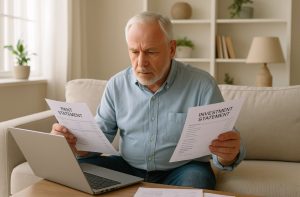
Pensioners with additional sources of income may need to file a tax return, depending on how that income is taxed, or not taxed, at source.
You may need to file a tax return if:
- You receive rental income from letting out a property
- You earn dividends from shares exceeding the dividend allowance
- Your savings interest surpasses the personal savings allowance
- You’re self-employed or receive income from consulting or freelance work
- You receive income from overseas pensions or properties
- You’ve made capital gains above the annual exemption
These types of income are often untaxed or under-taxed by default. Unlike PAYE income, which deducts tax automatically, you are responsible for reporting this income correctly. Filing a tax return allows you to pay the correct tax and avoid future penalties or interest.
Even if the income seems small, when combined with your pension, it could push your earnings above the personal allowance, triggering a filing requirement.
How to Check If You Need to File a Tax Return?
If you’re unsure whether you’re required to complete a self-assessment, there are tools and guidelines that can help clarify your situation.
Use HMRC’s self-assessment checker tool on their website. This online form asks questions about your income sources and will indicate whether you need to file.
Key reasons to file include:
- Your income exceeds the personal allowance
- You have untaxed income (e.g., rent, dividends)
- You claim expenses or tax reliefs
- You’ve made significant pension contributions
- You’re a higher-rate taxpayer
HMRC may issue a notice telling you to file. Even if you believe you’ve paid the right tax, once notified, you must comply. Failing to file when required could result in fines.
Pay close attention to any changes in your income. For example, taking a lump sum from your pension could affect your tax code and overall liability. Regularly review your financial position and consult the HMRC checker tool each tax year if your income situation changes.
How Do You File a Tax Return as a Pensioner?
Filing a tax return can be straightforward once you understand the process. Whether you’re doing it for the first time or have done it before, it’s essential to follow the correct steps to stay compliant.
Here’s how to do it:
- Register with HMRC if it’s your first time. You’ll receive a Unique Taxpayer Reference (UTR) and account access details.
- Gather all relevant documents such as pension statements, savings interest certificates, dividend vouchers, and records of rental income.
- Log in to your HMRC personal tax account to complete the return online.
- Fill in the self-assessment tax return accurately using your income details.
- Submit your return by 31 January if filing online. Paper returns are due earlier, by 31 October.
- Pay any tax owed by 31 January to avoid penalties and interest.
You can also claim back overpaid tax or reliefs on contributions during this process. If you’re unsure, consider using a tax advisor to help you navigate the forms and ensure you’re claiming everything you’re entitled to.
What Are the Penalties for Not Filing When Required?
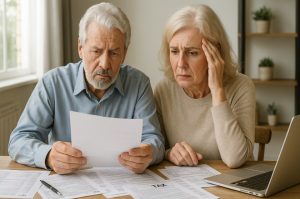
Failing to file a self-assessment tax return when required can lead to several penalties, which may escalate if left unresolved.
Here’s what can happen?
- Initial £100 fine for missing the deadline, even if you owe no tax
- Daily fines of £10 per day after three months (up to £900)
- Further penalties of 5 percent of the tax owed after six and twelve months
- Interest on unpaid tax starts accruing from the due date
- HMRC may issue a simple assessment, estimating what you owe
- Legal action may be taken, including seizing assets or deducting tax from pensions
- Prosecution is rare but possible in serious cases of tax evasion
To avoid these penalties:
- File your return on time
- Keep accurate records of all your income
- Contact HMRC if you’re unable to file for valid reasons
Always respond to notices from HMRC promptly. It’s far better to clarify your situation early than deal with late filing consequences later on.
Can You Reduce Your Tax Bill Legally?
There are several ways pensioners can reduce their tax liability legally by making use of various allowances and tax reliefs available under UK tax laws.
Ways to reduce your tax bill:
- Marriage Allowance: If your spouse earns less, you can transfer a portion of your allowance to them.
- Savings Allowance: Interest from savings is tax-free up to £1,000 for basic-rate taxpayers.
- Capital Gains Tax exemption: Annual exemption of £3,000 can be used against gains from property or shares.
- Gift Aid and charity donations: Claim back tax on donations if you’re a taxpayer.
- Flexible pension withdrawals: Use your 25 percent tax-free lump sum strategically to avoid pushing into higher tax brackets.
Pensioners don’t pay National Insurance, which is another way their overall tax cost is reduced. By planning withdrawals and managing income sources wisely, you can often stay within a favourable tax band. It’s advisable to review your income plan each tax year to make the most of these options.
What If You’ve Overpaid Tax on Your Pension?

Pensioners can sometimes overpay tax, especially if they’ve been put on an emergency tax code or received lump sum pension payments without the right deductions.
What You Can Do?
- Check your tax code regularly via HMRC’s Personal Tax Account. Errors can lead to overpayments.
- Use online tools to reclaim overpaid tax. HMRC has specific forms like P55, P53, and P50 depending on your situation.
- Look out for the P800 form, which outlines any overpaid tax. You may receive a cheque or instruction on how to claim.
- Keep all documents from pension providers and track all lump sum withdrawals.
If you believe you’ve overpaid but haven’t received a calculation, contact HMRC to initiate the process. Reclaiming overpaid tax is your right, and HMRC generally processes refunds within a few weeks.
Conclusion
Understanding whether you need to file a tax return as a pensioner in the UK depends largely on your income sources and amounts. While many retirees with only the state pension are not required to submit a return, those with private pensions, rental income, or savings interest may need to. Keeping track of your total earnings and staying within the personal allowance threshold is essential to avoid surprises.
Always check annually if your financial situation has changed and use HMRC tools for guidance. Filing a return, when necessary, not only keeps you compliant but could help you reclaim overpaid tax or unlock eligible tax reliefs. Stay informed and proactive to make your retirement as financially stress-free as possible.
FAQs
What’s the personal allowance for pensioners in the UK?
The personal allowance for the 2025/26 tax year is £12,570, which applies to pensioners as well as working individuals.
Is my state pension always tax-free?
No, the state pension is taxable, but tax is not deducted at source. You only pay tax if your total income exceeds the personal allowance.
How can I find out my current tax code?
You can check your tax code by logging into your Personal Tax Account on the HMRC website or by contacting HMRC directly.
What if I receive a notice to file but earn below the threshold?
If HMRC issues a notice, you must file even if your income is below the threshold. You can contact them to clarify or appeal the notice.
Are lump sum pension withdrawals taxable?
Yes, only 25 percent of a lump sum is tax-free. The remaining 75 percent is taxable based on your overall income.
Do pensioners pay capital gains tax?
Yes, if you make gains above the £3,000 exemption, you must pay capital gains tax, just like any other taxpayer.
Can I claim tax relief after retirement?
Yes, you can claim tax relief on charitable donations and pension contributions, depending on your circumstances.
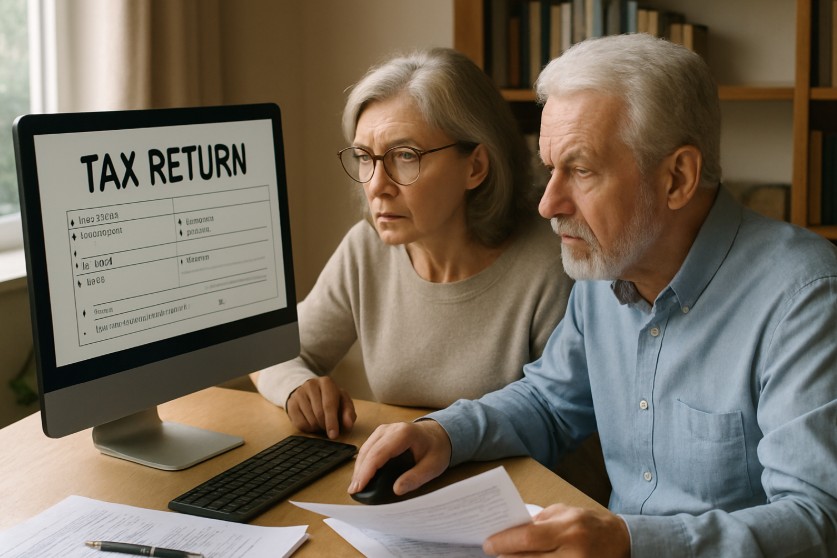












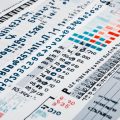

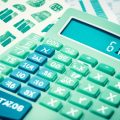




No Comments
Leave a comment Cancel